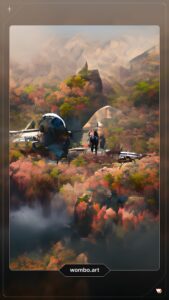March
21
This article is a different perspective on the looming apocalypse, up close and
personal as the old TV line goes. The article is entitled On Apocalypse Art,
Climate Divination, and "the Blob." The Blob came out in 1958, before many
of you were born. I was not yet 20 when I saw it, though my memory has me
seeing it as a 10-year old. I guess watching it brought on a child state.
The article is subtitled, "Molly Gallentine's Summer of Professionally
Contemplating he End of Humanity."
Read this article slowly and let it in.
Here is the link:
On Apocalypse Art, Climate Divination, and The Blob
February
18
Cèilidh of Dreams, scenes 19-20 now available.
Here is the direct link:
http://fexandcoo.website/COD%20-%20Scenes%2019-20.pdf
Enjoy!
Russ and Paco
January
3
The old man tapped his cane three times before he took a step and then three times again for the next step. In this way, stooped and bent, and hands shaking a bit, he made progress, slow but sure, to the librarian's desk. He tipped his red beret to the young women standing there watching him. She smiled in greeting and asked if she could help him.
"Yes," he said. "I'm in need of a book."
"Well," she replied, I hope we have what you are looking for. What is the title?"
"I know longer remember it, nor the author, but it is exactly the book I need now."
"Well then, do you recall what it is about?"
"Well, I have an image that's clear, but I can't seem to get the words to describe it."
"If you close your eyes, can you see it?"
"Yes, I can see it."
"Maybe you don't need a book."
"Why do you say that? You are a librarian."
"But sometimes, the book you need is not yet written. Perhaps your seeking the book is a way to find that you are the author. Could that be?"
December
18
There is a website (wombo.art) that uses artificial intelligence to translate words into artistic images
in various genres (etching, pastel, dark fantasy, mystic, etc.)
Here is the image for the words Fex and Coo in a fantasy style.

What is your reaction to this?
ral
December
15
The world may objectively exist but our encounter with it—in whatever way—fictionalizes it.
From most books on writing the novel, you will find that dreams are taboo. “Do not go there” is the general advice.
No one ever asks what novel the dream would write. Truth be told, all dreams are incipient novels.
Dreams, of course, are the focus of endless analysis, but analysis does not write novels, is not interested in this potency, always turning the dream into something else—to be generous, perhaps this too a fiction.
James Walton has reviewed Keith Ridgway’s new novel A Shock, titling his review, “Everything is Fiction,” in the December 16 edition of The New York Review of Books. Read it. Then read Ridgway. Then read your dream.
ral
December
3
From Science Daily:
Scientists around the world have been working in earnest to improve understanding of an increasingly virulent superbug, Clostridium difficile. The highly contagious hospital-acquired pathogen, designated by the Centers for Disease Control and Prevention as one of the five most urgent threats to the U.S. healthcare system, causes more than 500,000 infections and 29,000 deaths each year at a total societal cost exceeding $5 billion.
This under reported urgency is likely to become more frequent.
Governments will increasingly try to keep a lid on all "panic inducing" news. This is backward thinking when what is necessarily is for everyone to learn just what sorts of risks are mounting and the need not to panic, or deny, but to recruit effort in the right direction. Of course the politicization of everything makes this totally unlikely.
~ral
November
30
Hi all,
Here's some news from the world of science. Yes, scientists still exist in spite of Trumpian denial.
Tuesday, November 30, 2021
World's first living robots can now reproduce, scientists say
https://www.cnn.com/2021/11/29/americas/xenobots-self-replicating-robots-scn/index.html
Physicists Detect Elusive 'Ghost Particles' in The LHC For The Very First Time
https://www.sciencealert.com/for-the-first-time-neutrinos-may-have-been-detected-at-the-large-hadron-collider?fbclid=IwAR2lKWu6ZjxkUhpmBnBj9fiwl3hw3-SskX7fTEEakDrlCpWxtObJEtDN13E
In the quantum realm, not even time flows as you might expect
https://www.sciencedaily.com/releases/2021/11/211126130851.htm
ral
November
29
Proietti and co’s result suggests that objective reality does not exist.
There is a lively discussion gong on about this finding at fexandcoo.website
Be sure to check out the posts and commentaries.
ral
